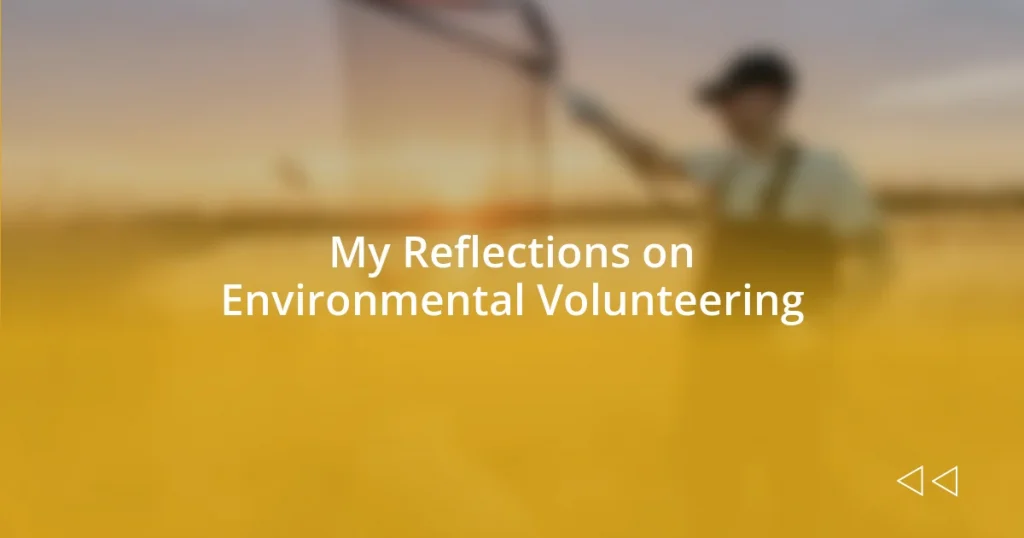Key takeaways:
- Environmental volunteering fosters a strong connection with nature and community, leading to personal growth, friendships, and a renewed sense of purpose.
- Key benefits include skill development, physical activity, mental well-being, increased awareness of environmental issues, and expanded networks through collaborative efforts.
- Challenges faced in volunteering, such as weather unpredictability and balancing commitments, often teach resilience, adaptability, and the value of community effort in addressing environmental degradation.
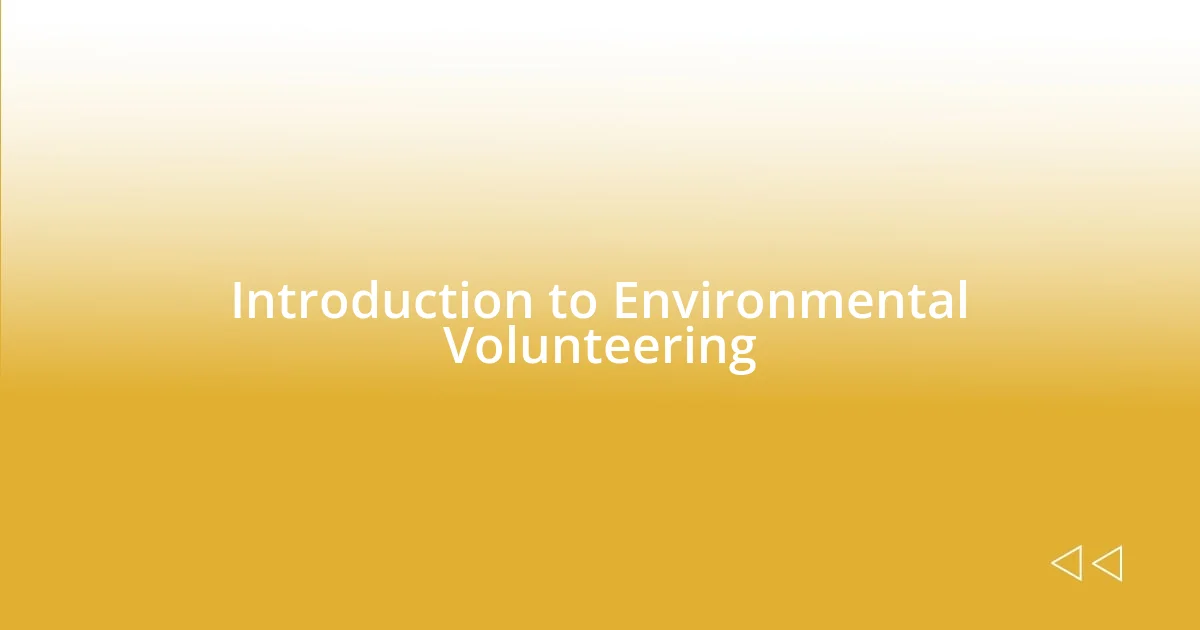
Introduction to Environmental Volunteering
Environmental volunteering is a unique opportunity to make a tangible difference in our communities and the planet. I remember my first tree-planting event; it was an incredible feeling to dig my hands into the earth, knowing I was doing something for future generations. Have you ever considered how each small action can contribute to a much larger cause?
When I think about the countless hours I’ve spent cleaning up local parks or beaches, I realize it’s not just about the physical work. It’s about creating a deep connection with nature and fostering a sense of responsibility. How often do we take the time to appreciate our environment and think about our role in protecting it?
Moreover, environmental volunteering opens doors to learning and growth. I found myself discovering new environmental issues and meeting like-minded individuals who inspired me to think differently. Isn’t it fascinating how engaging with others can ignite a passion for something greater than ourselves?
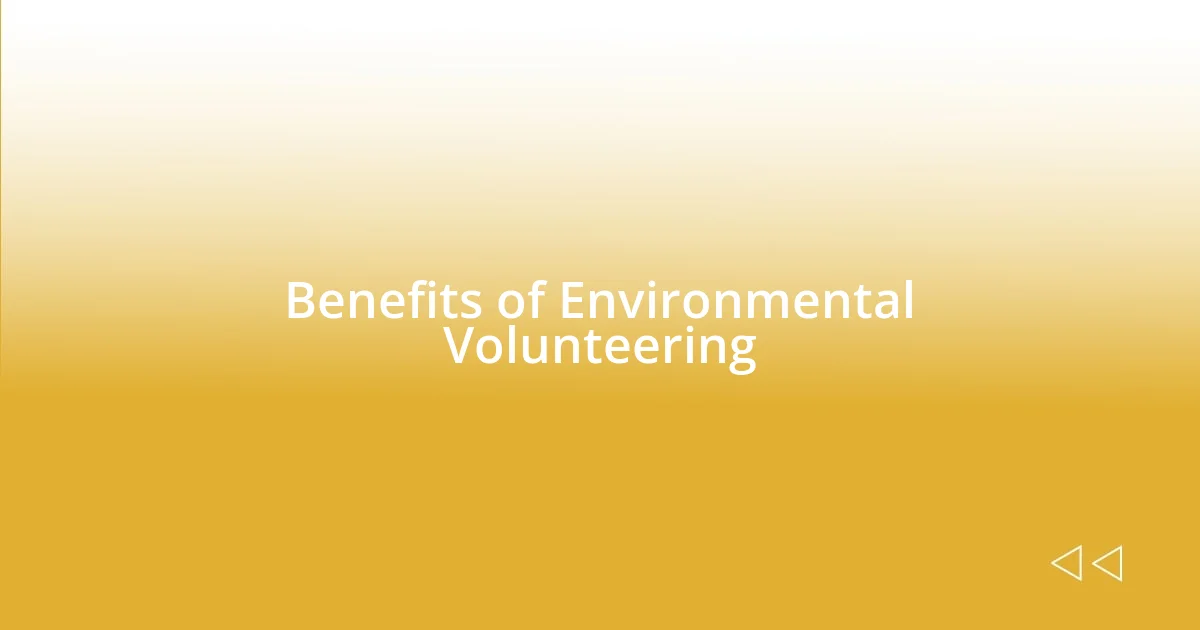
Benefits of Environmental Volunteering
Engaging in environmental volunteering offers remarkable benefits that go beyond just ecological impact. Personally, I often find that while I’m pulling litter from a beach, I’m also cultivating my own sense of community and connection. The conversations I have with fellow volunteers often lead to friendships and collaborations that extend far beyond a single event. It’s those meaningful interactions that remind me how we’re all in this together, striving for a healthier planet.
Here are some key benefits of environmental volunteering:
– Skill Development: I’ve gained practical skills like project management and teamwork while coordinating clean-up events.
– Physical Activity: Volunteering keeps me active, which is fantastic for both my body and mind. It’s a nice break from the screen-heavy days.
– Mental Well-being: Each time I step away from routine stress to focus on a cause I care about, I feel a renewed sense of purpose and fulfillment.
– Increased Awareness: Through hands-on experiences, I’ve developed a deeper understanding of environmental issues affecting my community.
– Networking: Working alongside passionate individuals has expanded my professional and social network, exposing me to new opportunities.
It’s these benefits, both tangible and intangible, that make environmental volunteering such a rewarding experience.
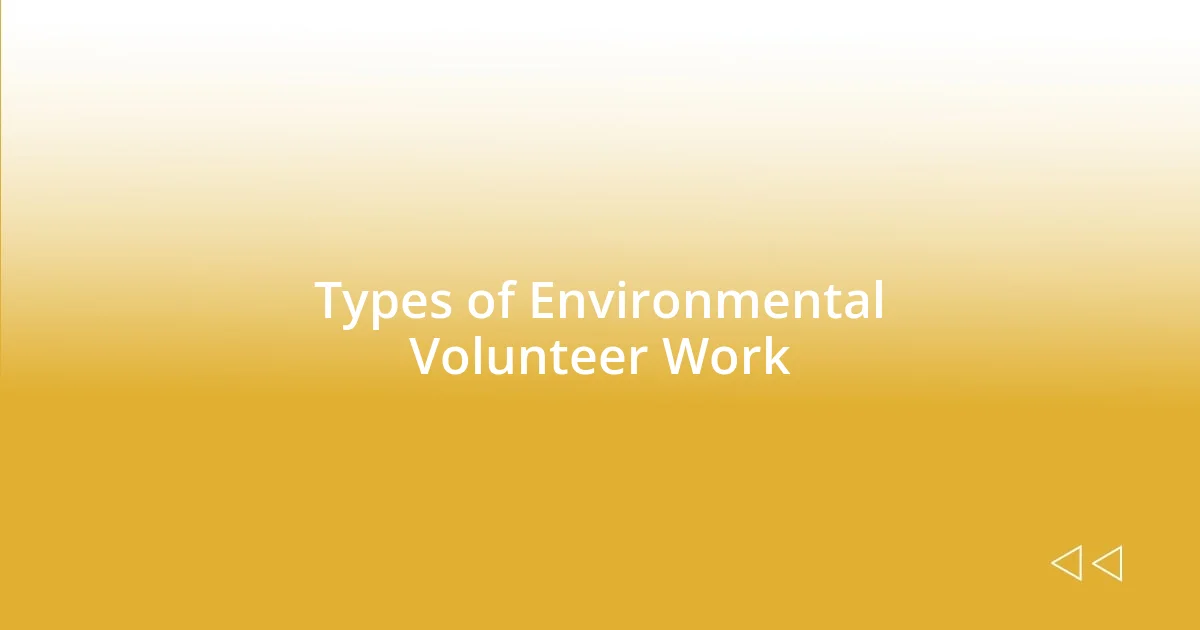
Types of Environmental Volunteer Work
When it comes to environmental volunteer work, the options are diverse and fulfilling. One type involves habitat restoration, where volunteers work to restore natural habitats impacted by human activity. I recall a moment from a marshland restoration project where I witnessed the gradual return of native species. That feeling of bringing life back to a degraded area was both humbling and empowering.
Another popular area is wildlife conservation. I once participated in a project aimed at tracking local bird populations. Not only did we gather important data for researchers, but I also found joy in observing these creatures up close. The experience deepened my respect for the delicate balance of ecosystems and reminded me of our responsibility to protect those vulnerable species.
You might also consider participating in community clean-ups. These events, whether in neighborhoods or natural areas, create a visible impact. I remember my first beach cleanup; it was astonishing to see the difference we made in just a few hours. I left with sun-kissed skin and a heart full of pride, knowing our efforts directly contributed to a healthier environment.
| Type of Environmental Volunteer Work | Description |
|---|---|
| Habitat Restoration | Restoring natural habitats affected by human activities, such as planting native vegetation. |
| Wildlife Conservation | Projects aimed at protecting and monitoring wildlife populations to ensure their survival. |
| Community Clean-ups | Organized events to clean up local parks, beaches, or neighborhoods, promoting community engagement. |
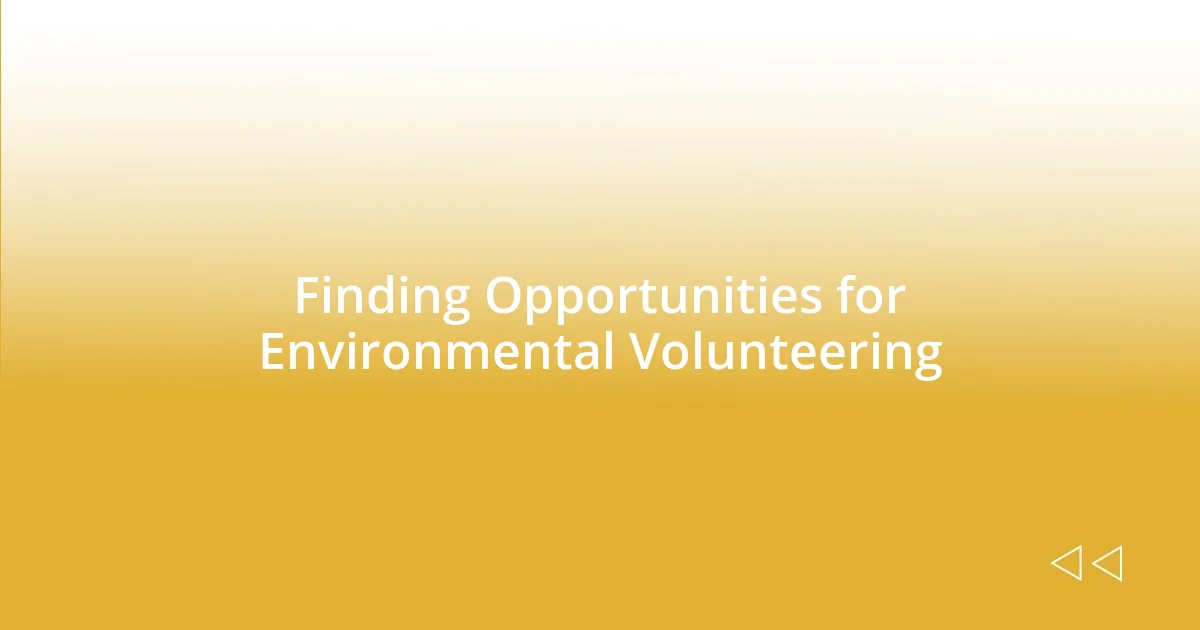
Finding Opportunities for Environmental Volunteering
Finding the right opportunities for environmental volunteering can sometimes feel overwhelming, but I’ve discovered that local community boards and social media platforms are treasure troves. When I first started, I simply browsed my neighborhood’s social media groups. I stumbled upon a post about a tree-planting event that quickly became one of my favorite experiences. Have you ever planted a tree? The feeling of nurturing a living thing from the ground up is truly rewarding.
Networking is another vital tool in uncovering volunteering opportunities. Connecting with other volunteers often opens doors to projects I would have otherwise missed. I recall meeting someone at a beach cleanup who invited me to join a wildlife rescue group. This sparked my passion for animal conservation, and now I find myself involved in various projects that continually surprise me. It’s fascinating how a single conversation can lead to new adventures!
Lastly, don’t underestimate the power of environmental organizations or non-profits. They frequently post upcoming events on their websites. I remember signing up for a local river cleanup through an environmental NGO, and it felt incredible to be part of a larger movement. When I showed up, I was greeted by seasoned volunteers who welcomed me with open arms. The energy was contagious, and it rekindled my motivation to keep giving back. Have you checked the websites of local organizations recently? You might just find your next meaningful adventure waiting for you!
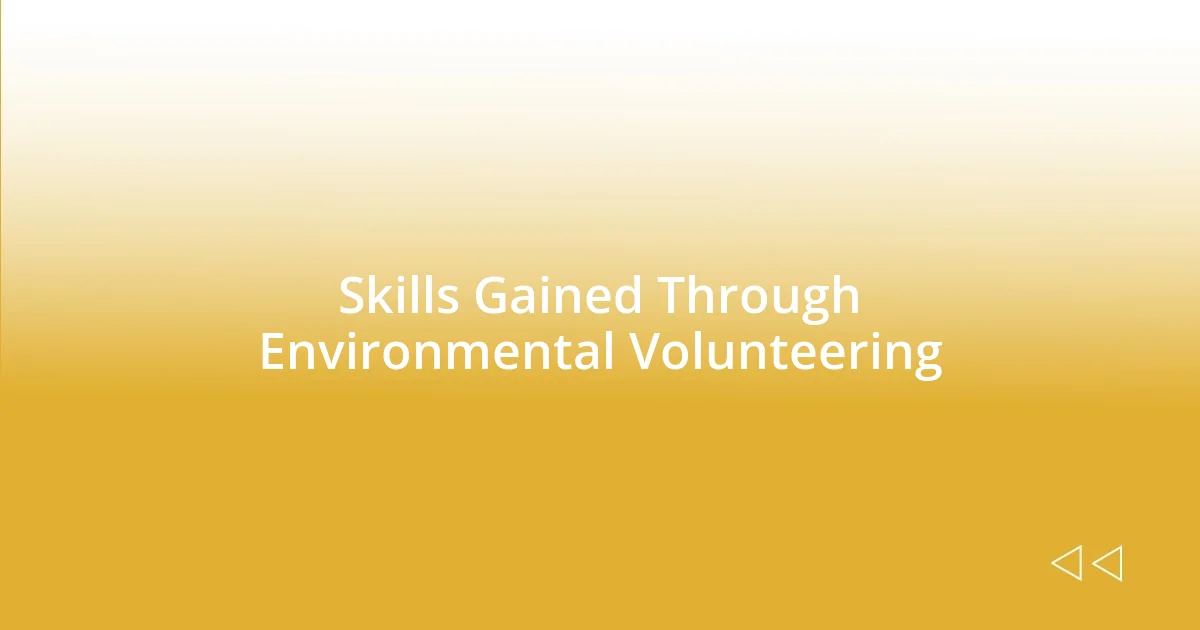
Skills Gained Through Environmental Volunteering
Volunteering in environmental projects has significantly enriched my skill set. For instance, while participating in a tree-planting initiative, I learned the importance of teamwork and communication. Working alongside others, we had to coordinate our efforts to ensure every sapling found its new home. Have you ever noticed how harmoniously a group can work when everyone shares a common goal?
Additionally, I found my problem-solving abilities sharpened during a litter cleanup event along a riverbank. We encountered unexpected challenges, like stubborn trash that refused to budge. I remember thinking on my feet, trying out different approaches until we successfully tackled the debris together. This experience taught me that sometimes, adaptability is a crucial skill when faced with obstacles.
Lastly, my environmental volunteering journey has honed my leadership skills. During a community garden project, I took the initiative to organize weekly meetings, and I was surprised by how effortlessly I could inspire others. Seeing fellow volunteers actively engage and share ideas filled me with pride. I started to understand that leadership isn’t always about directing; sometimes, it’s about fostering an environment where everyone feels valued. How have you experienced moments of leadership in your life?
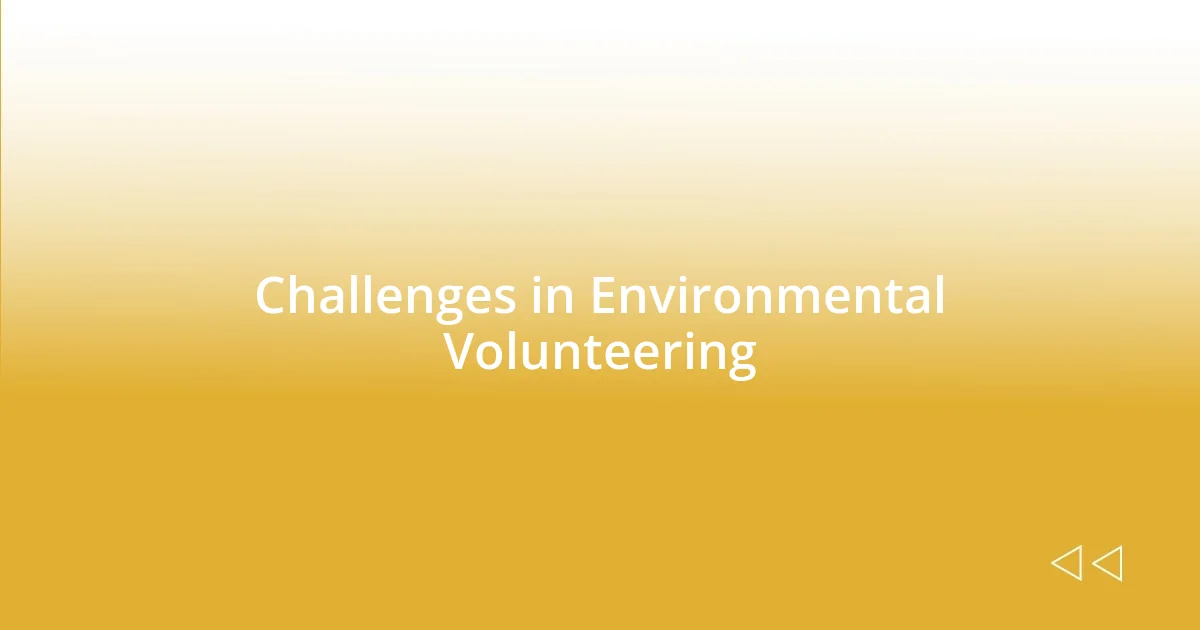
Challenges in Environmental Volunteering
When diving into environmental volunteering, I often encounter challenges that can feel discouraging. One of the most significant hurdles I’ve faced is the unpredictability of weather during outdoor projects. I remember a day at a local park where we planned to plant native flowers, but a sudden downpour turned our plans upside down. Have you ever had your commitment to a cause tested by nature? It taught me resilience and adaptability, reminding me that sometimes, the experience is more about the journey than the destination.
Another challenge is finding the right balance between volunteering and personal commitments. Juggling work, family, and volunteering can be a tightrope act. I vividly recall a time when I had to choose between attending a crucial meeting at work and a long-scheduled beach cleanup. The guilt weighed heavily on me, but ultimately, I decided to prioritize my job. Reflecting on it, I understood that it’s essential to recognize our limits, and sometimes, saying “no” opens up opportunities for greater involvement later on.
Lastly, there’s the emotional weight of seeing environmental degradation firsthand. I vividly recall the first time I participated in a litter pickup event at a local creek. The sheer volume of trash was disheartening. It was hard not to feel overwhelmed by the scale of the issue, prompting me to ask, “What difference can one person really make?” Yet, amid the despair, I found hope in the community’s collective effort, reaffirming that every small action contributes to a larger change. Have you felt both the weight of responsibility and the spark of hope in community projects? It’s a complex but rewarding experience that keeps me going.
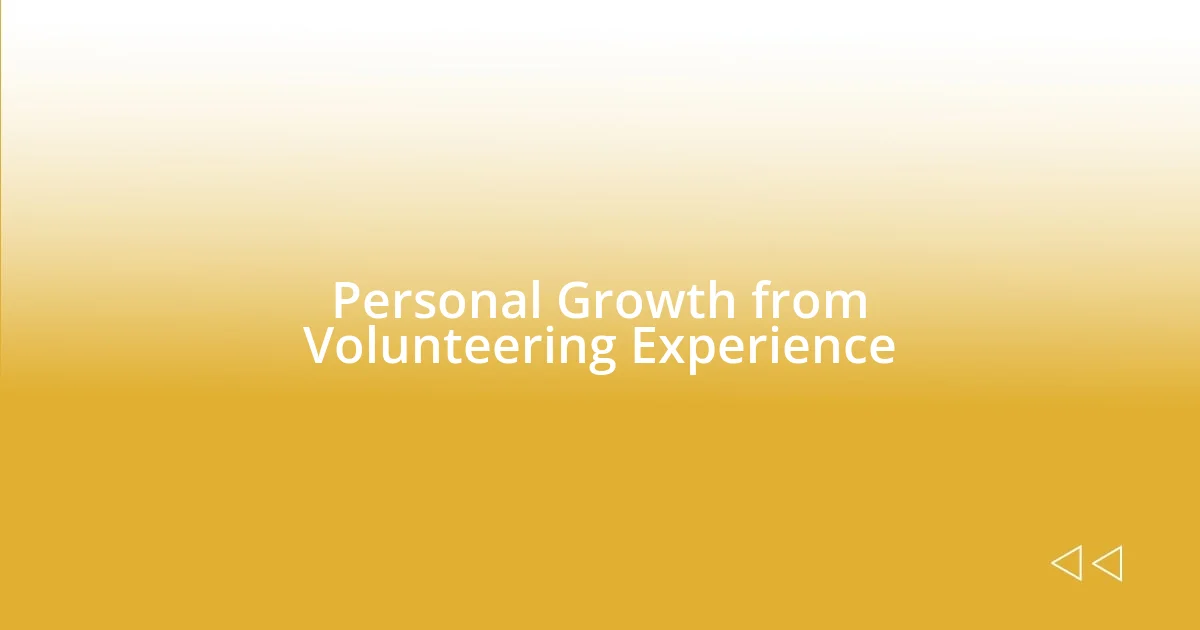
Personal Growth from Volunteering Experience
Volunteering in environmental projects has not only shaped my skills but has profoundly influenced my personal growth. I recall a moment during a community restoration project when I got to know a fellow volunteer from a completely different background. Our conversations about our diverging perspectives opened my eyes to new ideas and experiences I had never considered. Have you ever felt that rush of enlightenment when someone challenges your viewpoint? That sense of connection and mutual understanding jolted my appreciation for diversity, reminding me how our differences can elevate collective efforts.
Through these experiences, I have also gained a greater sense of purpose. There was a day when we worked tirelessly to revitalize a neglected park, and at the end of the day, I stood in awe of what we had transformed together. Seeing the smiles on children’s faces as they explored the newly restored space struck a chord deep within me. It was in that moment that I fully realized the tangible impact of our work. How often do we find ourselves yearning for a deeper significance in our daily lives? This sense of fulfillment drives me to continue volunteering, knowing that I play a part, no matter how small, in a larger narrative of environmental stewardship.
One of the most rewarding aspects of my volunteering experience has been the development of my emotional intelligence. I still remember a particularly challenging cleanup event where we encountered not just trash, but meaningful items that told stories of neglect. Each piece discarded represented a missed opportunity for care, prompting empathy in me. As I watched others grapple with their feelings about what we were cleaning, I learned to navigate these emotions, encouraging open discussions about the environmental issues at hand. Isn’t it fascinating how confronting discomfort can deepen our connections to each other and to the world around us? This insight has shaped how I interact with both nature and people, fostering awareness and compassion along my journey.










